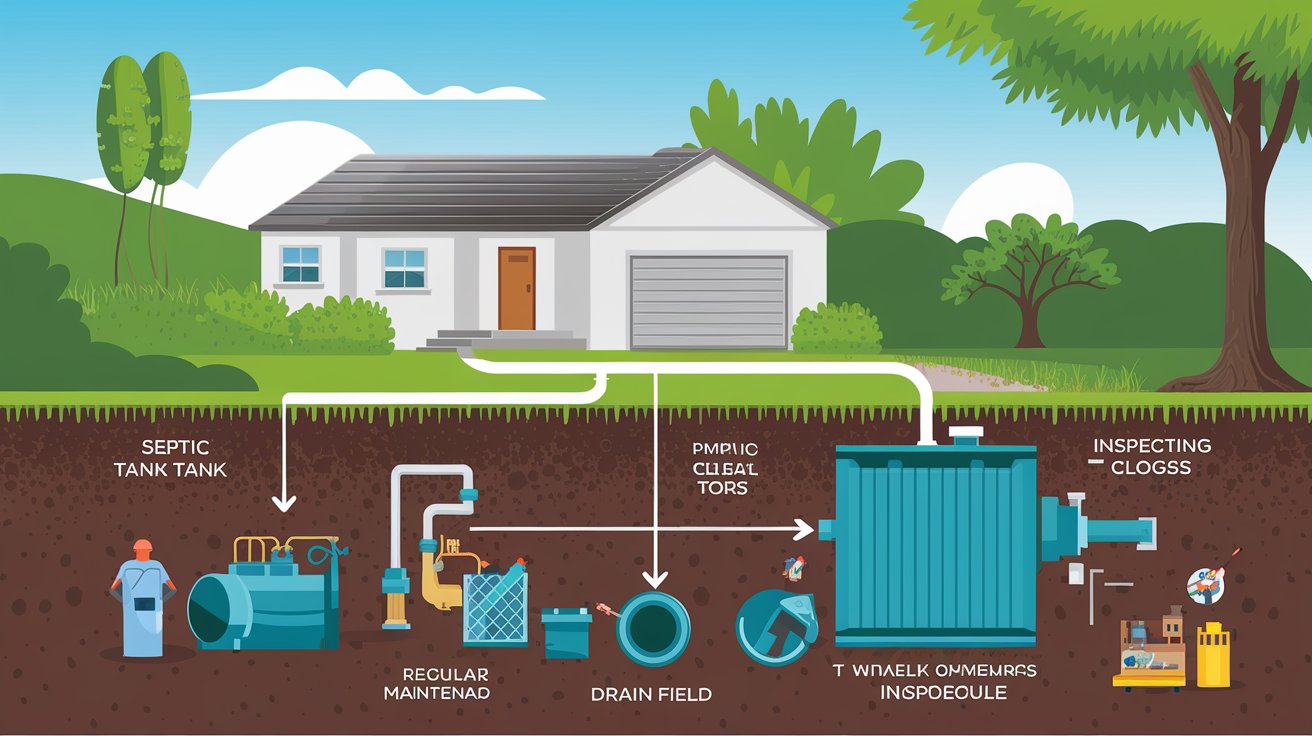Septic tank myths are widespread, and they can lead to costly mistakes when it comes to maintaining your system. Many homeowners believe that once a septic system is installed, it requires little attention. Others think it can handle any type of waste or that additives are essential for its health. These misconceptions can result in system malfunctions, costly repairs, and environmental harm. In this article, we’ll debunk some of the most common septic tank myths, helping you better understand the truth behind septic system care and maintenance. By the end, you’ll know how to properly care for your septic system and avoid the pitfalls of these widespread misconceptions.
- Understanding Septic Systems
- Myth 1: Septic Tanks Never Need Pumping
- Myth 2: Only Solid Waste Affects Septic Tanks
- Myth 3: Septic Tanks Are a One-Time Installation
- Myth 4: Septic Systems Are Always Expensive to Maintain
- Myth 5: Septic Tank Additives Are Necessary for System Health
- Myth 6: Septic Systems Can Handle Any Waste
Understanding septic tank myths is essential for proper system care. Many homeowners mistakenly believe that once installed, a septic tank doesn’t need much attention. In reality, regular maintenance, such as pumping and inspections, is crucial for keeping your system running smoothly. Dispelling these myths and following the right maintenance practices can help avoid costly repairs and ensure the longevity of your septic system.
Understanding Septic Systems
Before diving into the myths, it’s important to understand how septic systems actually work. A septic system is a self-contained wastewater treatment system used in areas without centralized sewage systems. It consists of a septic tank, where solid waste settles and decomposes, and a drain field, where the liquid waste is filtered and absorbed by the soil.
Proper maintenance of your septic system is crucial for ensuring it functions efficiently and lasts for years. Neglecting maintenance can lead to clogs, overflows, and even costly replacements. Understanding the function and care of your septic system is the first step in avoiding common misconceptions and protecting your investment. Let’s dive into some of the most common myths surrounding septic tanks and uncover the truth.
Myth 1: Septic Tanks Never Need Pumping
One of the most common myths about septic systems is that they don’t require regular pumping. Many homeowners believe that once a septic tank is installed, it will work efficiently forever without any major maintenance. However, this is far from the truth. Over time, solid waste and sludge accumulate in the tank, and if not pumped regularly, it can lead to clogs, system backups, and even tank failure.
The reality is that septic tanks require pumping every 3 to 5 years, depending on the tank’s size and the number of people using the system. Regular pumping helps remove accumulated solids, allowing the tank to function properly and preventing costly damage to the system. Neglecting this essential step can lead to wastewater backups, unpleasant odors, and expensive repairs. Keep in mind that while the frequency of pumping depends on various factors, scheduling regular inspections is a smart way to ensure your septic system remains in top condition.
Myth 2: Only Solid Waste Affects Septic Tanks
Another common misconception is that septic systems only process solid waste, and as long as you avoid flushing large objects, the system will function perfectly. While it’s true that solid waste is a primary component, it’s not the only thing that impacts your septic tank’s health. Household chemicals, non-biodegradable materials, oils, and even certain hygiene products can all cause serious harm to your system.
For example, pouring cooking oils or grease down the drain can clog pipes and create blockages in the tank. Similarly, flushing items like wet wipes, feminine hygiene products, and paper towels can lead to clogged pipes and potentially cause the septic tank to overflow. Even household cleaning products and chemicals can disrupt the natural bacteria in the septic tank, which are essential for breaking down waste.
To ensure your septic system functions properly, avoid flushing anything other than toilet paper and human waste. Dispose of chemicals, oils, and other non-biodegradable items in the trash. Being mindful of what goes into your septic system can help extend its life and prevent costly damage.
Myth 3: Septic Tanks Are a One-Time Installation
Some people believe that once a septic tank is installed, it will function perfectly for decades without requiring any attention. However, this is a major misconception. Septic systems are not set-it-and-forget-it installations; they require ongoing maintenance and periodic inspections to ensure they continue working efficiently.
Over time, a septic tank can deteriorate due to several factors, including soil conditions, tree roots, and normal wear and tear. The tank may need repairs or even replacement as it ages, especially if it wasn’t properly maintained. For example, tree roots can infiltrate the pipes or tank, causing blockages or leaks. In some cases, the soil in the drain field may become saturated or compacted, affecting its ability to filter and absorb wastewater.
Regular inspections can help identify issues early on, preventing major problems down the road. Neglecting your septic system could lead to expensive repairs or the need for a full replacement. To ensure your septic system remains in good condition, schedule regular maintenance and keep an eye on any signs of trouble. A small investment in inspections and upkeep can save you from costly repairs in the future.
Myth 4: Septic Systems Are Always Expensive to Maintain
Another common myth about septic systems is that maintaining them is always expensive. While it’s true that some repairs can be costly, regular maintenance and early intervention can prevent significant expenses in the long run. In fact, most of the costs associated with septic systems come from neglecting routine care.
The reality is that with regular pumping, inspections, and proper usage, septic systems can be relatively low-cost to maintain. For example, pumping the septic tank every 3 to 5 years is a small investment compared to the cost of replacing a failed system or dealing with a septic backup. Early detection of issues like clogged pipes or minor leaks can also help avoid larger, more expensive problems.
Another way to reduce maintenance costs is by practicing responsible water use. Avoiding overuse of water or draining harsh chemicals down the sink can help reduce the strain on your septic system. The key to keeping maintenance affordable is staying proactive and addressing minor problems before they turn into major, costly repairs.
By following basic septic care guidelines, you can ensure that your system runs smoothly and avoids the financial burden of major repairs.
Myth 5: Septic Tank Additives Are Necessary for System Health
Some homeowners believe that adding chemicals or septic tank additives is essential for keeping their septic system healthy. There’s a widespread misconception that these additives will help break down waste, prevent clogs, or improve the system’s performance. However, this is not necessary for most well-maintained systems.
Septic tanks naturally rely on bacteria to break down waste. These bacteria are crucial for the system’s proper functioning and are already present in the tank. In fact, adding chemical additives can harm the bacterial ecosystem, disrupting the natural processes that keep the system running smoothly. Overuse of chemical additives can also lead to damage to pipes, filters, and other components of the system.
For healthy septic tank maintenance, it’s best to avoid using additives and focus on regular pumping, proper waste disposal, and minimizing harsh chemicals. If you’re concerned about your system’s health, consult a professional for advice on maintaining the right balance of bacteria.
In short, most septic systems can thrive without the need for additional chemicals. Simple, natural maintenance practices can keep your system working effectively for years.
Myth 6: Septic Systems Can Handle Any Waste
A prevalent myth is that septic systems handle any kind of waste, from food scraps to chemicals. Some people assume that as long as they flush or pour waste down the drain, the septic system will take care of it. Unfortunately, this is far from the truth and can cause significant damage to your septic system.
Certain substances, such as cooking grease, non-biodegradable items (like wipes or paper towels), and harmful chemicals, can severely affect the functionality of a septic system. For instance, pouring grease down the drain can solidify inside the pipes and tank, leading to clogs and backups. Similarly, flushing items like wet wipes, even if labeled “flushable,” can cause blockages in the pipes and drain field. Harsh chemicals like bleach or drain cleaners can kill the bacteria in the tank that are essential for breaking down waste, compromising the entire system.
To ensure your septic system remains healthy, it’s important to be mindful of what goes down the drain or toilet. Only human waste and toilet paper should be flushed. Avoid pouring chemicals, oils, or non-biodegradable items into your septic system. Proper waste disposal habits not only protect your septic system but also save you from costly repairs or replacements.
Septic tank myths can easily lead to confusion and costly mistakes when it comes to maintenance and proper care. By debunking common misconceptions, we’ve highlighted the importance of regular pumping, mindful waste disposal, and avoiding unnecessary additives. In reality, septic systems require attention, just like any other home system. They can work efficiently for many years when properly maintained, but neglecting them can lead to expensive repairs and environmental issues.
By understanding the truth about septic systems, you can take steps to ensure yours remains in good working condition, saving money and avoiding headaches down the road. Need help with septic system maintenance? Check out our expert product reviews for more tips on keeping your septic system in top shape!
This wraps up our discussion on common septic tank myths, providing you with practical, accurate information to protect your system.
Directory | Washington Septic Service Providers | Part 1
DIY Repairs Are Always Cheaper
Septic Regulations in Rural Areas: Essential Guide for Rural Property Owners
The Role of Perforated Pipes in Drain Fields
What Happens During a Pumping Service?
Septic Tanks vs. Sewer Systems | Choosing the Right Option







